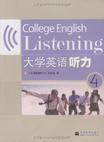大学英语听力4
出版时间:2009-8 出版社:高等教育出版社 作者:《大学英语听力》项目组 编 页数:209
前言
随着大学英语教学改革的不断深入,全国高校对大学英语听说能力的培养也更加重视。2007年颁布的《大学英语课程教学要求》规定:“大学英语的教学目标是培养学生的英语综合应用能力,特别是听说能力,使他们在今后学习、工作和社会交往中能用英语有效地进行交际,同时增强其自主学习能力,提高综合文化素养,以适应我国社会发展和国际交流的需要。”大学英语教学越来越多地加大听说内容的教学,而这方面的大学英语听力教材仍然有待于进一步完善,以适合不同层次学生的英语听力训练。 《大学英语听力》根据《大学英语课程教学要求》编写,以大量的听力材料和多种听力测试题型相结合,为学习者提供了多种多样、并且具有针对性的练习素材。该教材以英美文化背景为切入点,提供了不同语境下原汁原味的表达方式,使学习者接触到真实的语言环境,并训练学习者对文化背景、语境、语言材料的综合理解能力,特别是听力理解能力。学习者在提高听力水平的同时,能更加深入地了解西方文化。从而使他们在真实的语言环境中既学到了语言知识,又学到了文化知识。 教材中的听力材料内容多由幽默故事、趣味故事、童话、寓言、轻松对话和短文等各种文体组成,在主题化框架内展开听说训练。这些材料覆盖面广,涉及历史、文化、科普、名人传记和日常生活等诸多方面;贴近生活,不仅具有趣味性,而且注重知识性、可听性。丰富多彩的听说语料围绕主题反复强化语境,大大提高了语言点的复现率。该教材无论是在素材的选择上,还是在练习的编排上,都体现了新的教学理念和教学模式,使学习者在轻松而真实的语言环境中达到学习训练的目的。
内容概要
《大学英语听力》根据《大学英语课程教学要求》编写,以大量的听力材料和多种听力测试题型相结合,为学习者提供了多种多样、并且具有针对性的练习素材。该教材以英美文化背景为切入点,提供了不同语境下原汁原味的表达方式,使学习者接触到真实的语言环境,并训练学习者对文化背景、语境、语言材料的综合理解能力,特别是听力理解能力。学习者在提高听力水平的同时,能更加深入地了解西方文化。从而使他们在真实的语言环境中既学到了语言知识,又学到了文化知识。 教材中的听力材料内容多由幽默故事、趣味故事、童话、寓言、轻松对话和短文等各种文体组成,在主题化框架内展开听说训练。这些材料覆盖面广,涉及历史、文化、科普、名人传记和日常生活等诸多方面;贴近生活,不仅具有趣味性,而且注重知识性、可听性。丰富多彩的听说语料围绕主题反复强化语境,大大提高了语言点的复现率。该教材无论是在素材的选择上,还是在练习的编排上,都体现了新的教学理念和教学模式,使学习者在轻松而真实的语言环境中达到学习训练的目的。
书籍目录
Unit 1Section Ⅰ Main Ideas and Important DetailsPassage 1 Zimbabwe Children Are "Wasting Away"Passage 2 FashionsPassage 3 When Did Americans Begin Sending Greeting Cards?Section Ⅱ Listening-Based Integrated ExercisesPassage 1 Manners and Customs in Different CulturesPassage 2 LazinessPassage 3 Direct and Indirect TaxationSection Ⅲ Optional Listening ExercisesPassage 1 JumpPassage 2 White and BlackPassage 3 The Origin of the Song——"Happy Birthday to You"Unit 2Section Ⅰ Main Ideas and Important DetailsPassage 1 The Effects of the InternetPassage 2 Windows XPPassage 3 Internet BlogsSection Ⅱ Listening-Based Integrated ExercisesPassage 1 Finding Friends on the InternetPassage 2 Emotion-Sensitive ComputerPassage 3 Roborior: A Robot House-SitterSection Ⅲ Optional Listening ExercisesPassage 1 Low-Cost Computer Under ResearchPassage 2 The Process of Information TransferringPassage 3 Good Aspects of the DisasterUnit 3Section Ⅰ Main Ideas and Important DetailsPassage 1 Why Do Sharks Bite Human Being?Passage 2 A Spiders StoryPassage 3 The Fish in Great DangerSection Ⅱ Listening-Based Integrated ExercisesPassage 1 The Complex Social Structure of Ant SocietiesPassage 2 Snakes Are Not as Fearful as You May Have ThoughtPassage 3 Secrets of the Spider WebSection Ⅲ Optional Listening ExercisesPassage 1 The Study on Birds SleepPassage 2 The Biggest Disney WorldPassage 3 Crime as a Worldwide ProblemUnit 4Section Ⅰ Main Ideas and Important DetailsPassage 1 The Legal Marriage Age for Young AmericansPassage 2 The Nuclear and Extended FamilyPassage 3 Obama Talks About FatherhoodSection Ⅱ Listening-Based Integrated ExercisesPassage 1 Saving for a BabyPassage 2 Problems with Parent-Child RelationshipsPassage 3 The History of the Custom of Eating with a ForkSection Ⅲ Optional Listening ExercisesPassage 1 Why Do Americans Love Uniforms?Passage 2 Pizza: a World Popular FoodPassage 3 The Trends of Interdependent FutureUnit 5Section Ⅰ Main Ideas and Important DetailsPassage 1 The Differences Between Teaching and LearningPassage 2 Being a Writer Is Not EasyPassage 3 A Biography of Alexander FlemingSection Ⅱ Listening-Based Integrated ExercisesPassage 1 The Magic Memory GlassesPassage 2 Doubts About Speed ReadingPassage 3 Education in ChinaSection Ⅲ Optional Listening ExercisesPassage 1 A Love Story in Greek MythologyPassage 2 A Scientific Research on the Power of Positive ThinkingPassage 3 Unofficial Strikes in Britain UnitUnit 6Section Ⅰ Main Ideas and Important DetailsPassage 1 Are Small Aircraft a Good Alternative?Passage 2 Tour in LondonPassage 3 Electromagnetic Interference: a Cause of Aircraft CrashesSection Ⅱ Listening-Based Integrated ExercisesPassage 1 The Victoria Line: a Special RailwayPassage 2 Why Do People Enjoy Traveling?Passage 3 What Will the 2020 Car Look Like?Section Ⅲ Optional Listening ExercisesPassage 1 The Wright Brothers and Flying MachinesPassage 2 Cars Continued PopularityPassage 3 Who Doesnt Need to Wear a Seat Belt?Unit 7Section Ⅰ Main Ideas and Important DetailsPassage 1 Special Methods to Reduce Population in BrazilPassage 2 Its Time to Protect the EarthPassage 3 Beautiful Cities out of GarbageSection Ⅱ Listening-Based Integrated ExercisesPassage 1 The Jujube Plant That Will Save WhalesPassage 2 The Weather Prediction for Asia in 2050Passage 3 Lack of Water and Solutions to ItSection Ⅲ Optional Listening ExercisesPassage 1 Water ErosionPassage 2 The Way to Reducing Car PollutionPassage 3 Agriculture in the U.S.A.Unit 8SectionⅠMain Ideas and Important DetailsPassage 1 A Guide to Health for TouristsPassage 2 Avian InfluenzaPassage 3 Cola: a Cure for HeadacheSection Ⅱ Listening-Based Integrated ExercisesPassage 1 Health Is Most PreciousPassage 2 Keeping Pets to Reduce the Risk of Heart DiseasePassage 3 Concerns over Lack of Sleep in the U.S.A.Section Ⅲ Optional Listening ExercisesPassage I The Importance of Rest in Athletic TrainingPassage 2 The Importance of Medical InsurancePassage 3 Negative Attitudes Toward EuthanasiaUnit 9Section Ⅰ Main Ideas and Important DetailsPassage 1 Visual CommunicationPassage 2 Forms of Pub-TalkPassage 3 The Way People CommunicateSection Ⅱ Listening-Based Integrated ExercisesPassage 1 The Advantage of EmailsPassage 2 IPod Media Players and MP3 Players……Unit 10Key to Exercises and Transcripts
章节摘录
Everyone knows that taxation is necessary in a modem state: without it, it wouldnot be possible to pay the soldiers and policemen who protect us; nor the workersin government offices who look after our health, our food, our water, and all theother things that we cannot do for ourselves; nor also the ministers and members ofparliament who govern the country for us. By means of taxation, we pay for things thatwe need just as much as we need somewhere to live and something to eat. But though everyone knows that taxation is necessary, different people havedifferent ideas about how taxation should be arranged. Should each person haveto pay a certain amount of money to the government each year? Or should therebe a tax on things that people buy and sell? If this kind of taxation is used, shouldeveryone pay the same tax, whether he is rich or poor? If the second kind of tax ispreferred, should everything be taxed equally? In most countries, a direct tax on persons, which is called income tax, exists. Itis arranged in such a way that the poorest people pay nothing, and the percentage oftax grows greater as the taxpayers income grows. In England, for example, the taxon the richest people goes up as high as ninety-five percent! But countries with direct taxation nearly always have indirect taxation too.Many things imported into the country have to pay taxes or "duties". Of course, itis the men and women who buy these imported things in the shops who really haveto pay the duties, in the form of higher prices. In some countries, too, there is a taxon things sold in the shops. If the most necessary things are taxed, a lot of money iscollected, but the poor people suffer most. If unnecessary things like jewels and furcoats are taxed, less money is obtained but the tax is fairer, as the rich pay it. Probably this last kind of indirect tax, together with a direct tax on incomeswhich is low for the poor and high for the rich, is the best arrangement.
图书封面
评论、评分、阅读与下载
